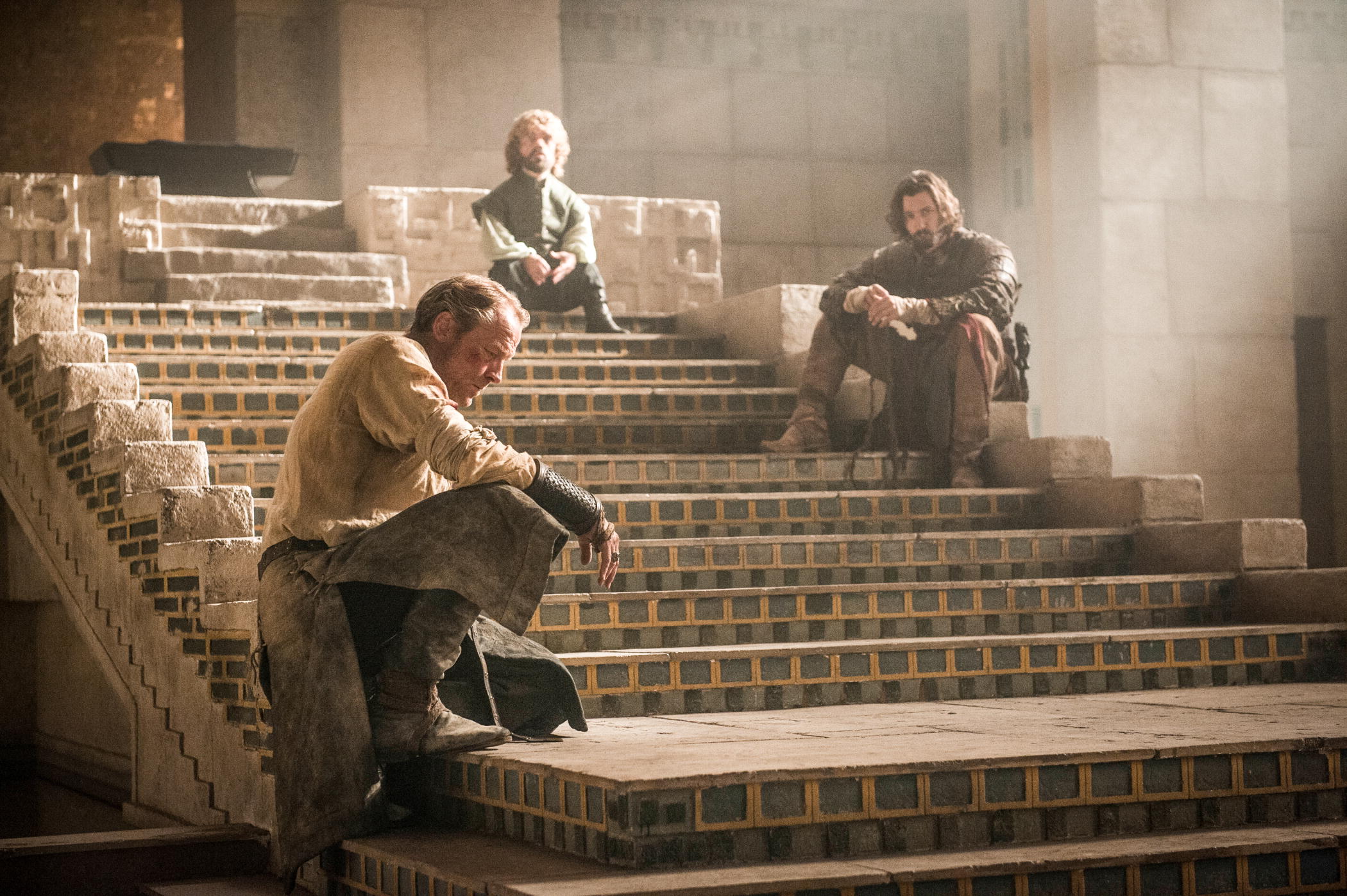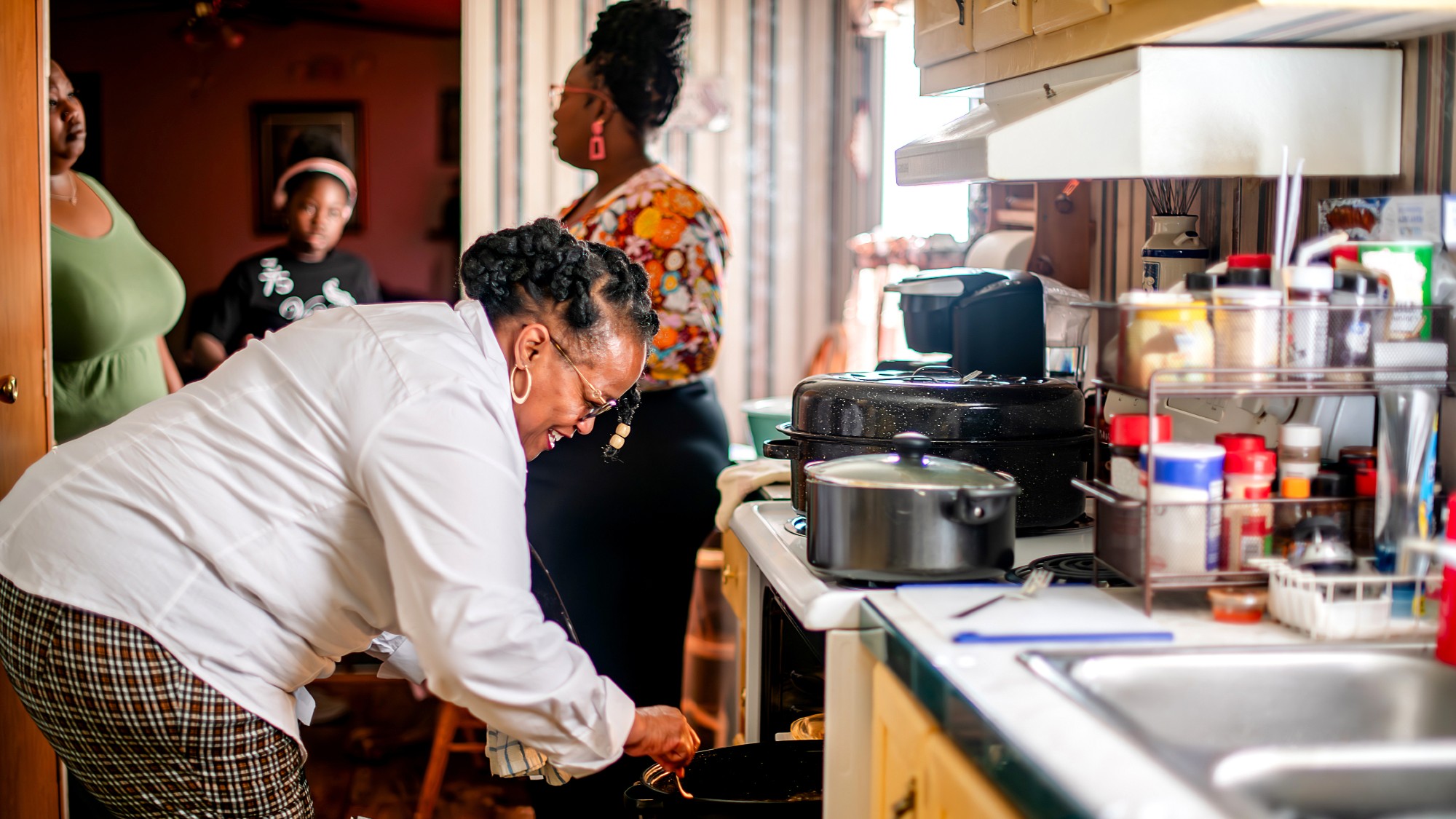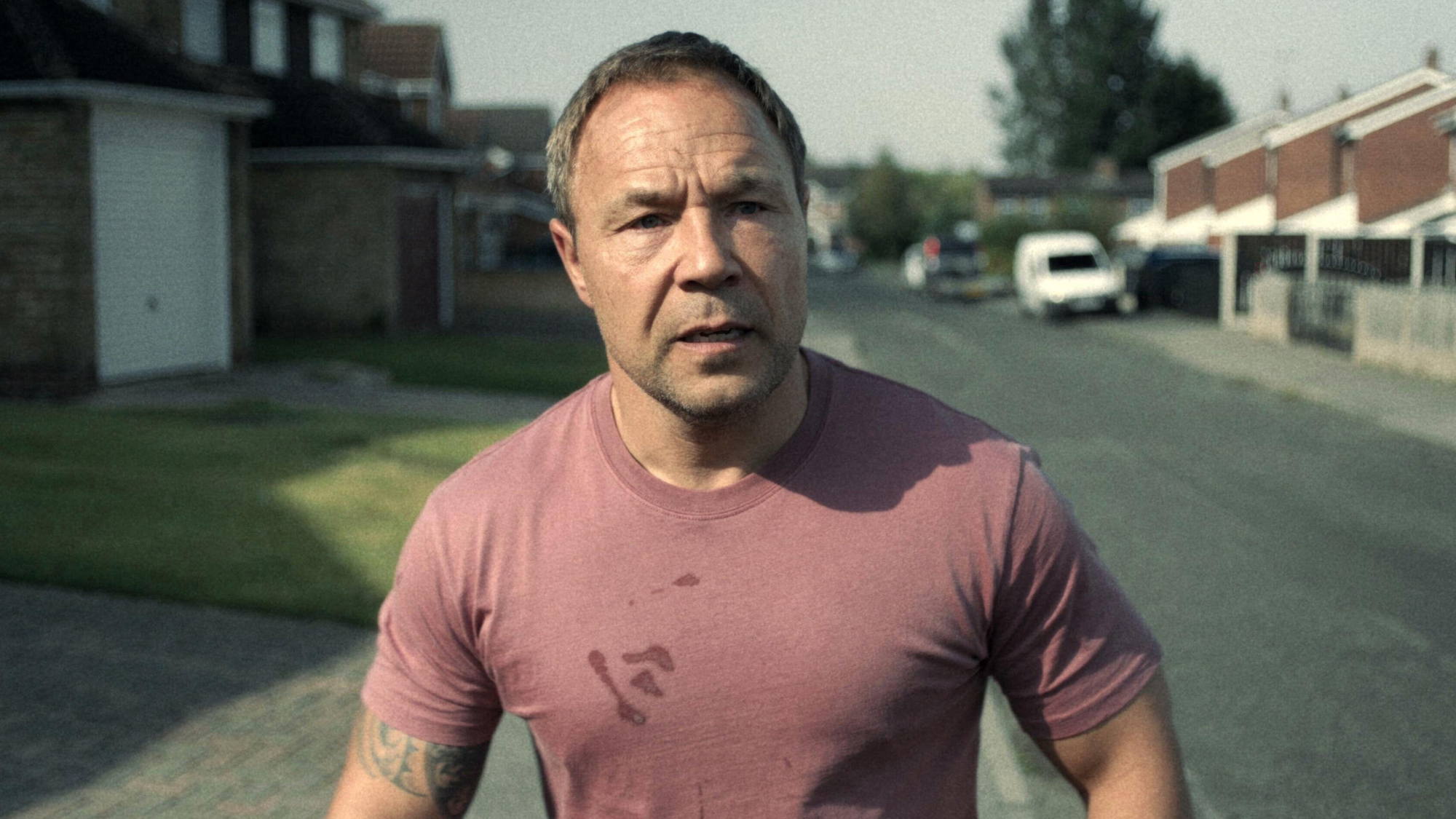Game of Thrones season finale recap: Sunday, bloody Sunday
Even by its own elevated standards, the finale of the HBO drama's fifth season racks up an absurdly high body count


Selyse Baratheon. Stannis Baratheon. Theon Greyjoy. Sansa Stark. Meryn Trant. Myrcella Baratheon. Jon Snow.
No, that's not the latest draft of Arya Stark's murder list. That's the list of major characters that died in a single episode of Game of Thrones.
Okay, okay. Apparently died. At this point in the series, there's nothing profound about noting how few characters are safe in Game of Thrones— but even by the show's drastically elevated standards, it's hard to believe that so many major characters would be obliterated in a single bloodbath of an episode. And when a TV show like Game of Thrones piles up bodies, there's only one question left to answer: Who's actually dead, anyway?
The Week
Escape your echo chamber. Get the facts behind the news, plus analysis from multiple perspectives.

Sign up for The Week's Free Newsletters
From our morning news briefing to a weekly Good News Newsletter, get the best of The Week delivered directly to your inbox.
From our morning news briefing to a weekly Good News Newsletter, get the best of The Week delivered directly to your inbox.
That's a more complicated question than it might initially seem. Game of Thrones can be brutal, but it rarely cheats; even where the books have used their point-of-view conceit to tease apparent "deaths" — Theon Greyjoy, "killed" during the attack on Winterfell, or Arya Stark, "killed" during the Red Wedding — the TV show has gone out of its way not to leave viewers with any confusion whatsoever about which characters are still in play. At times, the TV show has made certain characters' deaths definitive while the books aimed for ambiguity — or avoided reviving characters who definitely died altogether.
So if you're a TV-only viewer who's dreading the idea of spending the next eight months avoiding spoilers from people who have already read the books, relax: They don't really know much more than you anyway. For the first time in years, we can dig into these questions without worrying whether anything is being spoiled for those who haven't read the books. (And for the record, I'm only interested in analyzing these questions from the text of the show itself; if you're interested in extratextual analysis about why Jon Snow will or will not return to Game of Thrones next year, you'll find plenty of evidence — on both sides of the argument — elsewhere on the internet.)
Selyse Baratheon:
Definitely dead, in a suicide-by-hanging that serves as an early harbinger of Stannis Baratheon's Worst Day Ever.
A free daily email with the biggest news stories of the day – and the best features from TheWeek.com
Stannis Baratheon:
Definitely dead, after leading the remainder of his army in a "Charge of the Light Brigade"-style battle against the forces of the Boltons. Last week, Stannis made the horrifying decision to burn his own daughter at the stake, but it wasn't until "Mother's Mercy" that the full, horrifying ramifications of his tragic arc came to pass. Stannis killed Shireen because Melisandre convinced him the sacrifice was necessary to ensure his victory against the Boltons. Instead, the sacrifice ensures his defeat, as "nearly half" of his army deserts him in disgust.
Stannis' decision to murder his own daughter should have made him irredeemable, so it's a great credit to Stephen Dillane — much better in this difficult role than he's ever gotten credit for — that his actual death feels so bitter and poignant. It's no surprise that Brienne of Tarth serves as Stannis' ultimate executioner, but his final words are perfectly suited to his no-nonsense way of life: "Go on. Do your duty." If I have any quibble with the scene, it's that Game of Thrones cuts from the actual moment of Stannis' death to Ramsay Bolton. For both Brienne and for the viewers, the One True King deserved a beat to let the full weight of his death sink in.
Theon Greyjoy and Sansa Stark:
This is where it gets interesting. On a pure, rational level, there is absolutely no reason to believe that Theon and Sansa would survive their leap from the walls of Winterfell. (After all, we just saw Theon push Ramsay's psychotic lover Myranda to her death on the other side of the wall — and that drop looked a lot shorter.)
But come on: There's no way Game of Thrones pushed Theon and Sansa through a gauntlet of miseries just to end with a Thelma and Louise moment, right? I have no idea how the series will justify their survival after leaping from a wall that's purportedly at least 80 feet high — and I sincerely hope the answer isn't "the snow cushioned their fall!" — but I can't imagine season six will begin without Theon and Sansa, relatively unharmed and on the run from Winterfell, with Ramsay Bolton desperately hunting his two favorite targets.
Meryn Trant:
Definitely dead, in as brutal a killing as Game of Thrones has ever depicted. I'm not convinced Game of Thrones needed to subject us to two young girls being savagely beaten before Arya went in for the kill, but it certainly made her bloody, sadistic revenge on Meryn Trant — who killed her swordfighting trainer Syrio Forel all the way back in season one — all the more satisfying. "Do you know who I am? I'm Arya Stark," she says to Meryn as he sputters on the brink of death. "Do you know who you are? You're no one. You're nothing."
Of course, "revenge" is outside the scope of a Faceless Man, and Arya's decision to fulfill a personal vendetta over an assigned assassination is met with a harsh rebuke from Jaqen H'ghar. Her decision to use "no one" as the final insult she gave Meryn before his death is telling; "no one," after all, is who Jaqen has urged Arya to be all season. When Arya returns to the House of Black and White, there's a heavy price to pay for her unwillingness to cast aside her personal grievances: her eyesight. But her final vision is both horrifying and aspirational: an endlessly changing face that shows a fully trained Faceless Man can be anyone — including her. If she only completes her training, the same power may still be within her reach.
Myrcella Baratheon:
If season five has had any significant misfire, it's been Dorne: a boring place full of unusually one-dimensional characters, including the hugely disappointing Sand Snakes — who turned out to be little more than goofy Mega Man villains (complete with signature weapons). In the end, the payoff to the Dorne story is predictable (and a little underwhelming): the death of Myrcella Baratheon, who falls victim to a poison kiss from Ellaria Sand as she sails back to King's Landing with her uncle/father Jaime.
From a storytelling perspective, Myrcella's death makes perfect sense. We've barely gotten to know her, so her death isn't particularly painful — but from a political perspective, the stakes between the Lannisters and the Martells could hardly be higher. Jaime will undoubtedly figure out who was behind his daughter's death. Will he kill Trystane Martell, his shipmate, in retaliation? Will Doran Martell execute Ellaria for the assassination — or did he have some hand in it? And how will King Tommen and Cersei react to the news of Myrcella's death? With any luck, this cruel escalation will give the Dorne storyline the momentum it needs next year.
Jon Snow:
Come on. He can't really be dead, right?
Yes, Game of Thrones has killed off many main characters — but never anyone who served as the sole anchor to a major story. Ned Stark's death set the War of the Five Kings into motion; Khal Drogo's death inspired Daenerys' transition from Khaleesi to Mother of Dragons; the Red Wedding signaled Game of Thrones' shift from the heroism of the Starks to a broader, bleaker view of Westeros. By contrast, killing Jon Snow at the crux of his arc would be a baffling storytelling choice. Personally, he's never been more interesting, and in a larger context, he's never been more important. It was just two episodes ago that Game of Thrones revealed the full extent of the White Walker threat, retroactively justifying all the time we've spent at the Wall. If Jon is dead, and Sam is gone, who will serve as our point of view in the pivotal battle to come? Not Alliser or Olly, who are the only other Night's Watch members I can even identify by name.
Game of Thrones has even laid a plausible path for Jon Snow to come back from the dead. Several seasons ago, Arya met up with Beric Dondarrion, a knight who died and came back to life through the magic of a man called Thoros of Myr. Thoros happens to be one of the few characters we've met who worships the Lord of Light, Melisandre's deity of choice. Earlier this season, Game of Thrones went out of its way to point out Melisandre's sudden obsession with Jon Snow. If she, like Thoros, has the ability to revive the dead, Jon Snow would make an obvious target — and she conveniently abandoned Stannis just in time to return to the Wall for Jon Snow's "assasination."
There's a difference between subverting storytelling principles and abandoning them. Killing Jon Snow would be gutsy, but it would also be stupid — and Game of Thrones tends to be a lot savvier about the stories and characters on which it spends so much time.
But as breathlessly as "Mother's Mercy" jumped from brutal death to brutal death, it's the fates of the show's remaining major players that have stuck with me in the hours since I first watched the finale. After her escape from Mereen on a dragon in last week's episode, Daenerys Targaryen has landed miles from home, surrounded by an unfamiliar khalasar, in a sudden reminder of the powerlessness she faced before she became a self-made queen. In Daenerys' absence, Tyrion Lannister will serve as the unlikely leader of Mereen — a role he'd unintentionally been grooming himself for since his stint as the Hand of the King for his nephew Joffrey.
And back in King's Landing, we saw Cersei's deeply cruel forced penance for her affair with her cousin Lancel: a long, naked walk through the streets of King's Landing, with the townsfolk jeering and pelting her with garbage as she winds her way up to the Red Keep.
Game of Thrones has often been criticized for its flippant use of nudity — which has, at the worst of times, led to a kind of grotesquely eroticized sexual violence. But just as the show's first season finale used nudity to emphasize the fullness of Daenerys Targaryen's rebirth by fire, "Mother's Mercy" uses nudity to emphasize how much Cersei — arguably Game of Thrones' central villain — has been forced to lay herself bare at the mercy of an unexpected adversary. The High Sparrow's cruel form of atonement extends beyond the private acknowledgement of sin and into the realm of public shame; there's no justice and no justification for the raw awfulness of Cersei's treatment.
Lena Headey's wordless performance is as striking as anything any actor has done on Game of Thrones this season. (She received an Emmy nomination for Game of Thrones' fourth season, and she's an even stronger candidate this year.) Cersei's rage, humiliation, and courage are all equally on display as she endures her punishment; it's only when she's safely behind the walls of the Red Keep that she collapses into tears.
But there are subtle cues that the scene, as wrenching as it is, will not be Cersei's defeat. Listen carefully to the score as she walks naked through the streets of King's Landing. That's "The Rains of Castamere" — a song written to herald one of the Lannister family's earliest and greatest triumphs, and later, to mark the start of the cold but decisive victory of the Red Wedding.
It's certainly possible to read the use of "The Rains of Castamere" as ironic — a once-great family whose signature anthem has been perverted to suit its public fall from grace. But that's not how I see it. Cersei, unlike her brothers Tyrion and Jaime, may never be fully redeemed into one of Game of Thrones' central heroes — but it's hard not to be both moved and stirred by her enormous well of inner strength. There's a triumph in her escape, however horrible, from the dark cell where she was punished — and the first chance to make good on her promise to seek vengeance.
It's also the sole moment in the widespread brutality of "Mother's Mercy" that definitively crosses the line between life and death. As Cersei escapes to the safety of the Red Keep, she's swept into the arms of the newest member of the Kingsguard: Gregor "The Mountain" Clegane, miraculously reanimated after his death at the hands of Oberyn Martell last season — the latest example of something "impossible" actually happening. Every year, Game of Thrones raises new possibilities, broadening its horizons as the story twists and turns. For the first time, when season six begins, every viewer will be on the same page. And with so many stories left to tell, it's going to be a very long wait.
Read more Game of Thrones recaps:
* Game of Thrones recap: A simple twist of fate
* Game of Thrones recap: Winter is here
* Game of Thrones recap: Why can't we be friends?
* Game of Thrones recap: 'Unbowed, Unbent, Unbroken'
* Game of Thrones recap: 'Kill the Boy'
* Game of Thrones recap: In the mood for love
* Game of Thrones recap: Goin' to the chapel
Scott Meslow is the entertainment editor for TheWeek.com. He has written about film and television at publications including The Atlantic, POLITICO Magazine, and Vulture.
-
 7 bars with comforting cocktails and great hospitality
7 bars with comforting cocktails and great hospitalitythe week recommends Winter is a fine time for going out and drinking up
-
 7 recipes that meet you wherever you are during winter
7 recipes that meet you wherever you are during winterthe week recommends Low-key January and decadent holiday eating are all accounted for
-
 Nine best TV shows of the year
Nine best TV shows of the yearThe Week Recommends From Adolescence to Amandaland
